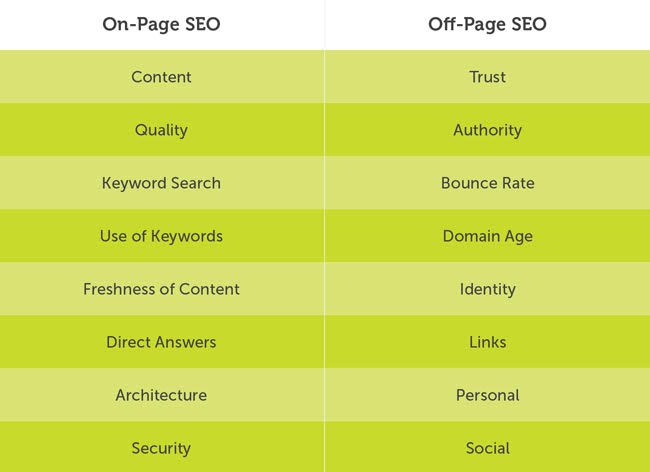What’s SEO?
While topically broad, SEO is defined as maximizing the number of visitors to your website by ensuring your site appears prominently in the search engine’s list of results. SEO can be broken down into four categories: on-page, off-page, technical and local. As of April 2020, Google maintains 86% of the market share of search engine usage. So generally, when talking about SEO, best practices are centered around Google.
But the core of successful SEO hasn’t changed – be the answer for your consumer in your industry.
Ultimately, Google rewards web pages with authority and trust. With over two hundred determining factors for Google algorithms alone, SEO is an increasingly intelligent discipline. The two hundred plus factors can be grouped into dynamic, ever-evolving categories including:
- Domain
- Page-level
- Site-level
- User Interaction
- Backlink
- Brand Signals
- Google Algorithm Rules
- On-site Web
- Off-site Web
As SEO algorithms change, so do the ethics around transparency. White hat SEO, or realistically grey hat SEO, is used for long-term results. Black hat SEO tricks will only work in the short-term and ultimately don’t achieve successful results.
Elements of an SEO-optimized Page

A Look at SEO Elements
Optimizing a web page for Google and other search engines involves many factors including user experience, keywords, social networks, authenticity, authorship, responsiveness and accessibility.
Provides Authentic Value
Bringing real value is ultimately the best way to increase web traffic and performance and directly relates to successful SEO. Value goes beyond self-promotion and content must be significantly better than the industry standard. Use engaging text, images and multimedia that is authentic and relevant. This encourages consumers to stay on the page versus leaving the page to look for a better answer to their question somewhere else.
Optimal User Experience
Consumers are used to a convenient digital experience that prioritizes ease of use and speed. Successful SEO relies on user-friendly content and navigation elements in a high-quality, branded design. A fast page render, <0.5 second to first response and <4 seconds for content to load, is also important for all browsers and devices.
Keyword-targeted
In 2020, SEO is well beyond a list of single keywords. Keyword phrases, in titled elements, page headlines and body copy, should target a singular searcher intent and associated phrases. Consumers search for answers that are logical and comprehensive so secondary keywords should also be used in context. Beyond the copy, descriptive anchor text for links and appropriate attributes for images are just as critical.
Sharable on Social Networks
While adding social network sharing options is a baseline best practice, the content must employ the appropriate tags and descriptive URLs. Ultimately, the sharing value increases with the quality of the content. High-quality content that speaks to a specific audience will always perform the best.
Authorship, Meta Data, Schema and Rich Snippets
Content must be associated with the mark up via the Google attribution. Using primary and secondary keywords, meta descriptions should be employed as appropriate to country and language.
Multi-device Responsiveness
Responsiveness for all devices is standard practice. This includes using the same URL on every device, optimizing for any screen size and proper rendering in highly used browsers.
Crawler/Bot Accessibility
It’s imperative that to reach the URL, no more than four clicks are needed, and the user is redirected from older versions. The server shouldn’t restrict search crawler IPs and dynamic URL parameters aren’t used. Loading the content in HTML allows for easy indexing of the website.
What’s been reviewed above is just a high-level overview of SEO. The best practices of SEO change as technology exponentially evolves. Yet, one of the most effective ways to guarantee successful SEO is high-quality content. Top notch content is created through research and industry expertise. While understanding SEO on your own can be overwhelming, finding an experienced SEO agency can save your business time and money. Instead of wading through the daily algorithmic changes, an expert can ensure every page of your website is optimized to provide the perfect answer to your target audiences’ exact search question.
Looking for a local SEO agency? Let’s talk.
Want to learn more about marketing from industry experts? Join our email list.